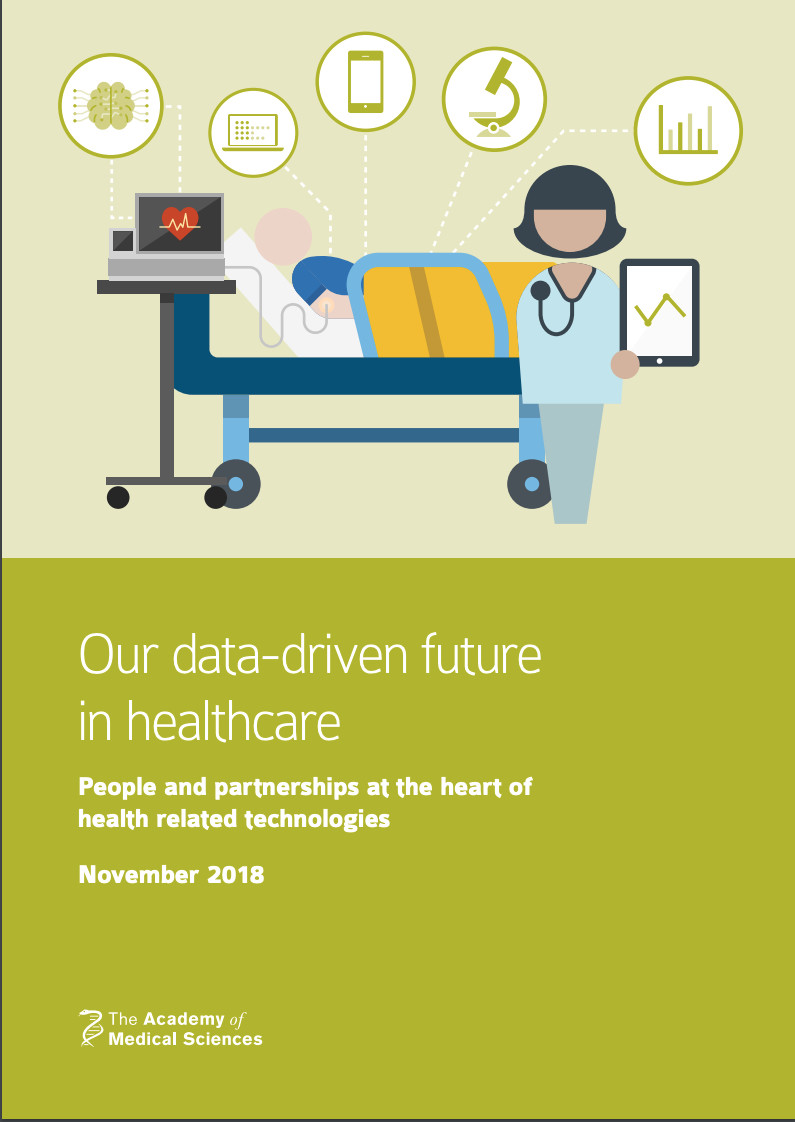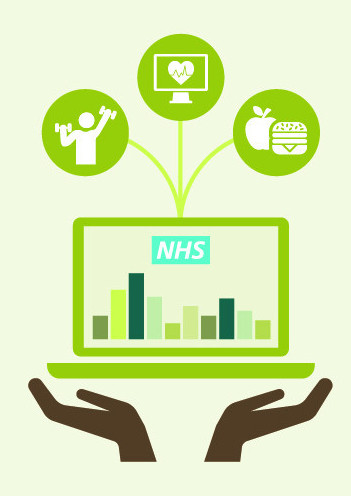There has been much public dialogue focusing on the current use of patient data, but less has been undertaken exploring how future data-driven technologies might impact on this.
Recent reports have investigated attitudes to the use of patient data for individual care, research and planning. However, less is known about patient and public perspectives on new and future technologies that will rely on patient data for their development or use. [1]
To address this, the Academy commissioned Ipsos MORI to undertake a programme of dialogue workshops in early 2018 to explore public, patient, and healthcare professionals’ views about new and emerging data-driven technologies – technologies that use patient data for health and social care. Following this, the Academy held a policy implications workshop with NHS representatives, regulators, funders, policy-makers and researchers, as well as pharmaceutical, medical technology, data and digital health companies, to discuss the implications of the findings of the dialogue workshops.
The dialogue programme and policy workshop are the foundation for the Academy’s policy project, which sets out principles to guide the future use of data-driven technologies in healthcare. The project steering group is a multi-disciplinary panel of experts (see ‘steering group’ tab), Chaired by Professor Carol Dezateux CBE FMedSci. It has also incorporated and aligned with relevant work being undertaken by other key stakeholders, and has involved extensive stakeholder engagement across the data and technology landscape in healthcare.
The policy and public dialogue reports are now available on the right hand side of this page. The full report can also be downloded here. For more information, please contact [email protected].
[1] The Royal Society & British Academy (2017). Data governance: public engagement review. https://royalsociety.org/~/media/policy/projects/data-governance/data-governance-public-engagement-review.pdf
- Professor Carol Dezateux CBE FMedSci, Professor of Clinical Epidemiology and Health Data Science, Queen Mary, University London (Chair)
- Dr Natalie Banner, Policy Adviser, Wellcome Trust and Understanding Patient Data (co-opted for policy stage of the project)
- Dr Kambiz Boomla, Clinical Senior Lecturer in the Clinical Effectiveness Group, Queen Mary, University of London
- Professor Mandy Chessell CBE FREng, IBM Distinguished Engineer, IBM Master Inventor, Visiting professor (University of Sheffield)
- Professor Susan Michie FMedSci, Professor of Health Psychology and Director of the Centre for Behaviour Change, University College London
- Professor John Naughton, Emeritus Professor of the Public Understanding of Technology, Wolfson College, University of Cambridge
- Dr Amara Nwosu, Medical Doctor and Clinical Lecturer in Palliative Care, University of Liverpool
- Professor Jill Pell CBE FRSE FMedSci, Director, Institute of Health and Wellbeing, University of Glasgow
- Jonathan Sellors, Legal Counsel and Company Secretary, UK Biobank
- Professor Lionel Tarassenko CBE FREng FMedSci, Professor of Electrical Engineering and Head, Department of Engineering Science, University of Oxford
- Dr Mary Tully, Director of Public Engagement for Connected Health Cities, University of Manchester
- Professor Dame Til Wykes DBE FMedSci, Professor of Clinical Psychology and Rehabilitation, King’s College London
In November 2017, the Academy and Understanding Patient Data commissioned Ipsos MORI to conduct a series of public dialogue workshops exploring perspectives on the future use of data-driven technologies in healthcare.
In February 2018, six workshops brought together around 100 members of the public, patients and healthcare professionals in London, Sheffield and Cardiff.
Through a series of case studies, the workshops explored participant views on when, how and by whom health data should be collected, used and shared. Participants also considered how new technologies, such as AI and machine learning, might impact themselves, their friends and families, workplaces and wider society. The design of the dialogue was informed by a development workshop involving key stakeholders, as well as with input from the Academy’s project steering group.
The independent Ipsos MORI report from these workshops has been published and can be found to the right hand side of this page. Both the public dialogue workshops and the stakeholder workshop helped inform the steering group in developing the principles aimed at guiding the use of data-driven technologies for health by organisations which collect, store, share and use health data.
As part of the evidence gathering for the policy project, on 24 April 2018 the Academy convened a workshop of key stakeholders to discuss the implications of the findings of the Ipsos MORI public dialogue workshops.
Participants were drawn from across academia, digital health, data and pharma companies, the NHS, learned societies and the regulatory, funding and charity sectors. Participants were asked to consider the policy implications of the findings from the dialogue programme and consider how these could be captured in principles to guide the future deployment of data-driven technologies that use patient data in the NHS. Discussions focused on four aspects of patient data use by data-driven technologies: control of data; reliability of technologies; transparency of processes; and accountability.
The findings from this workshop were published alongside the final policy report, and the report of the public dialogue, all of which can be found on the right hand side of this page.
Following the publication of the report, the Academy and partner organisations have supported the Office for Life Sciences in their development of a framework for realising of benefits derived from health data. As part of this, Understanding Patient Data and NHS England have commissioned further public dialogue to explore public and patient views on access to and use of NHS-held health data by other organisations.
On 22 January 2020 the Academy, along with Health Data Research UK and the Collaboration for the Advancement of Sustainable Medical Innovation at UCL, held a workshop to explore commercial models for data-access agreements between the NHS and other organisations. The Academy’s 2018 report and the recently commissioned public dialogue formed key sources of evidence for this workshop. The report of this workshop, Realising patient and NHS benefits from health and care data - From policy to practice, can be downloaded using the link on the right hand side of this page.


